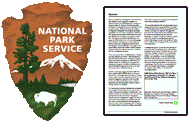United States National Park Service

United States National Park Service: Publications
Date of this Version
2008
Abstract
Geocaching, a sort of modern-day treasure hunt using Global Positioning System (GPS) units, has been prohibited in most national parks largely due to federal regulations prohibiting disturbance or damage of natural features and leaving behind unattended property. National parks, including Acadia National Park in Bar Harbor, Maine, are continually challenged by unauthorized geocache sites within their borders. The National Park Service (NPS) must take enforcement action when necessary to prevent resource damage and ensure visitor safety. However, it has become clear that geocaching is a well-established, popular pastime that is more than just a trend, and some parks perceive positive benefits in constructively managing the use.
Acadia National Park’s pilot, NPS-sponsored EarthCache program is an example of how the agency’s responsibility to preserve resources and provide for appropriate visitor enjoyment can be achieved while fulfilling some of the desires of the geocaching community


Comments
Published in Weber, Samantha, and David Harmon, eds. 2008. Rethinking Protected Areas in a Changing World: Proceedings of the 2007 GWS Biennial Conference on Parks, Protected Areas, and Cultural Sites. Hancock, Michigan: The George Wright Society.